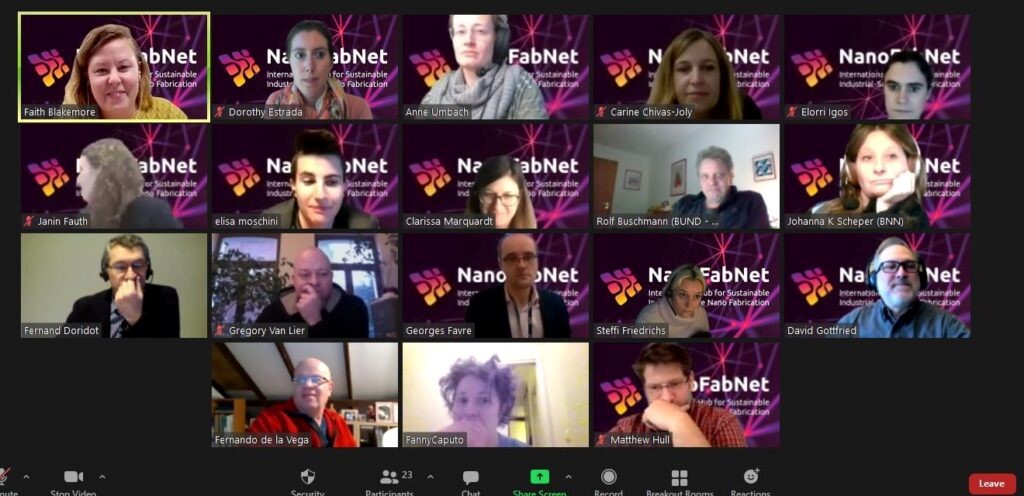On January 20-21, 2021, the NanoFabNet consortium hosted an interactive online workshop, which attracted more than 170 participants from the research, industrial, and academic sectors working in the fields of nanotechnology and sustainability, gathering valuable insights into the needs and solutions for the development of this important sector.
The Institute for Automation and Applied Informatics (IAI) of the Karlsruhe Institute of Technology (KIT) as a partner led the day's discussions on the topic of sustainability and the NanoFabNet Hub Structure.
The aim of the workshop was to offer nanotechnology stakeholders the opportunity to discuss the challenges and opportunities currently facing the sector, as well as the chance to connect to other professionals and researchers to build the nano community. The information collected will be used to structure the upcoming NanoFabNet Hub (the core output of the NanoFabNet project) to be launched in 2022.
A variety of sessions were held at the workshop. Specific breakout sessions included:
- Sustainability & NanoFabNet Hub Structure
- Validation, Harmonisation, Standardisation & NanoFabNet Hub Structure
- Ethical Requirements of Nanotechnology & Nanofabrication
- Infrastructure & Skills of Nanotechnology & Nanofabrication
- Global NanoFabNet Communications & User Experience
The workshop enabled lively discussion and exchange, encouraging attendees to actively engage in the process through various online tools, which saw the event maximising the quality of outcomes. From live polling to interactive whiteboard sessions, presentations to the 1st NanoFabNet Pub Quiz, attendees were offered a full programme to support the aims of the event.
Lead Project Coordinator and CEO of AcumenIST Dr Steffi Friedrichs considered the event a success. “We had planned a complex meeting with interactive tools to come as close as possible to the much missed and needed face-to-face experience of engagement workshops – everything was live and happened in real-time, and it all worked very well. The workshop’s success was evident from the lively participation and the engagement of attendees, and their input gave us the valuable information our consortium needs to now firmly establish the NanoFabNet Hub for the community.”
The main outcomes of the discussions have already proven helpful in aligning and developing the ongoing strategy for the NanoFabNet Hub, which will now be implemented over the coming months. From gaining a solid overview of the needs for facilitating knowledge exchange, delivering workshops and developing new trainings, to the requirements for sustainability indicators, validation services and harmonisation support, the event was able to explore the needs of this community, gathered directly from those who are at its heart, allowing the NanoFabNet Hub to co-create solutions directly with those who would benefit from them.
Other insights were also gained in the areas of high-level characterisation and metrology activities as well as ethics requirements for the sector as a whole, which can now pave the way for further proactive initiatives to be implemented by the NanoFabNet Hub. User requirements for online and in-person services for the sustainable nanotechnology community were also explored in- depth to ensure that whatever initiatives and solutions the NanoFabNet Hub implements, these will be conducted through a user-friendly approach, ensuring constant value and relevance in this emerging work.
To join in these efforts as a stakeholder or for more information about project partners, upcoming events and our ongoing outcomes, please visit the NanoFabNet website: https://www.nanofabnet.net or contact NanoFabNet∂AcumenIST.com.


